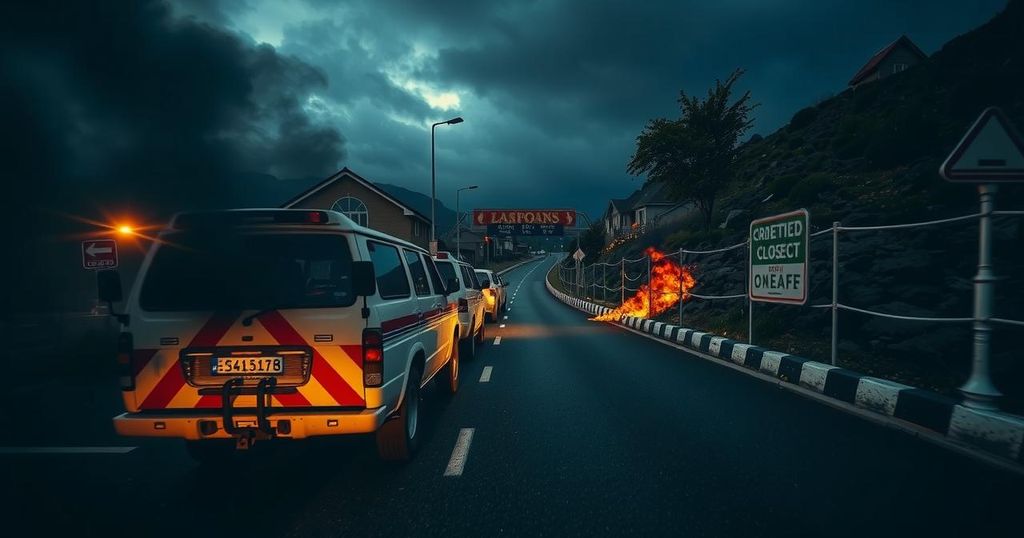South Africa Closes Lebombo Border Crossing Amid Mozambique Election Violence
South Africa has closed the Lebombo border with Mozambique due to violent protests following a disputed election. The unrest has seen vehicles torched and clashes reported, prompting safety measures by South African officials. Travelers are advised to use alternative crossings until further notice as authorities manage the situation and prevent violence from spilling over to South Africa.
South Africa has temporarily closed the Lebombo border crossing with Mozambique amid escalating violence following the country’s disputed presidential elections. Reports indicate that protests erupted after the ruling Frelimo party was declared the winner, inciting clashes in various cities, with vehicles being burned on the Mozambican side. In response to safety concerns, the South African Border Management Authority has taken precautionary measures to protect travelers, advising them to utilize alternate border crossings until further notice. Lebombo serves as one of southern Africa’s busiest land ports, located approximately 110 kilometers from Maputo, Mozambique’s capital. The unrest in Mozambique has resulted in severe disturbances, including the setting ablaze of an immigration office, and has prompted some government officials to seek refuge in South Africa. Although the South African side of the border remains unaffected by the violence, comprehensive safety measures are in place to ensure travelers’ well-being. Protests ignited in late October following the announcement of electing Daniel Chapo of the Frelimo party, which has led to accusations of electoral malpractice by opposition figures, such as Venâncio Mondlane, who expressed fears for his safety. The pervasive unrest has claimed numerous lives, with reports suggesting at least 18 fatalities, as protests continue despite governmental attempts to quell the situation. Furthermore, internet access in the region has been restricted, further compounding the challenges faced by citizens. In light of the ongoing crisis, the Mozambique Defense Minister has indicated potential military deployment to restore order ahead of anticipated nationwide protests, characterized as attempts to undermine the established government. Given these developments, the situation remains fluid, prompting continued assessments from both countries’ authorities.
The Lebombo border crossing has been a crucial transit point between South Africa and Mozambique, facilitating movement for trade and travel. Following Mozambique’s controversial presidential election, characterized by accusations of vote-rigging and a lack of transparency, the subsequent unrest poses considerable threats not just to internal stability but also to regional relations. South African authorities remain vigilant, ensuring that violence does not spill over into their territory, as tensions continue to escalate in Mozambique, affecting daily lives and commerce on both sides of the border. Investigations and responses from South African agencies also reveal the seriousness with which they are addressing the unfolding situation, aimed at safeguarding all travelers. The electoral tensions in Mozambique stem from a pattern of political grievances and longstanding issues between the ruling party and opposition factions, amplifying calls for accountability within the electoral process. Such dynamics highlight the fragile state of democratic governance in the region and the importance of international oversight and dialogue between political parties.
In summary, the closure of the Lebombo border crossing reflects the serious security concerns resulting from post-election violence in Mozambique. As protests continue to escalate, South African authorities are taking proactive measures to ensure the safety of travelers and maintain border integrity. The situation underscores the urgent need for dialogue to resolve political disputes and restore stability in Mozambique, while also illustrating the ripple effects that domestic unrest can have on neighboring nations. The actions taken by both governments will be critical in managing this emerging crisis.
Original Source: www.bbc.com




Post Comment